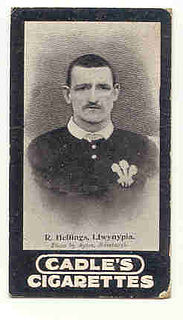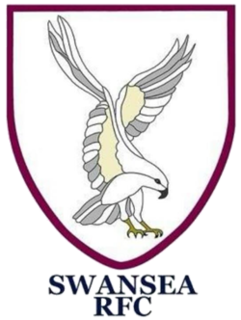
Arthur Joseph "Monkey" Gould was a Welsh international rugby union centre and fullback who was most associated as a club player with Newport Rugby Football Club. He won 27 caps for Wales, 18 as captain, and critics consider him the first superstar of Welsh rugby. A talented all-round player and champion sprinter, Gould could side-step and kick expertly with either foot. He never ceased practising to develop his fitness and skills, and on his death was described as "the most accomplished player of his generation".
Thomas Cooper Graham was an England-born Welsh rugby union international forward who played club rugby for Newport. He won 12 caps for Wales and was seen as intelligent, mobile forward player. Graham is most notable within rugby for his captaincy of Newport, which saw the team through one of their most successful periods, including the 1891–92 "invincible" season.
Tom Clapp was an English-born international rugby union forward who played club rugby for Newport and Nantyglo RFC. He won 14 caps for Wales and captained the team on three occasions. Clapp was the first Newport player to captain Wales.
Francis Escott "Frank" Hancock was an English-born rugby union centre who played club rugby for Somerset and Cardiff and international rugby for Wales. Hancock is best known as being the sport's first fourth threequarter player, which changed the formation of rugby union play that lasts to the present day. His role in the development of rugby was recognised by the International Rugby Board in 2011 with induction to the IRB Hall of Fame.
Engineer Captain Charles Gerald Taylor LVO was a Royal Navy officer and Wales international rugby union player who played club rugby for Blackheath. He was the first Welsh international to be killed in action during World War I. Taylor was an all-round athlete, and at one time was the Welsh pole vault champion.
Frank Hill was a Welsh international rugby union forward who played club rugby for Cardiff. Hill won 15 caps for Wales over a period of ten years and was given the team captaincy on four occasions.
Charles Thomas was a Welsh international rugby union utility player who played club rugby for Newport and invitational rugby for the Barbarians. Thomas won nine caps for Wales.
Charles Theodore 'Theo' Harding was an English-born international rugby union player who played club rugby for Newport and international rugby for Wales. Harding was an all-round sportsman and also captained Newport Hockey Club in their very first season.
Rowland 'Rowley' Lewis Thomas was a Welsh international rugby union forward who played club rugby for London Welsh, of whom he was a founding member, and county rugby for Middlesex. Thomas played international rugby for Wales and was capped seven times.

Richard Hellings was an English-born Welsh rugby union forward who played international rugby for Wales and club rugby for Llwynypia. Hellings was noted for his strength built from years cutting coal as a Rhondda miner. Hellings later played rugby for Cardiff, Exeter and Devon.

George Herbert Gould was a Welsh international rugby union centre who played club rugby for Newport Rugby Football Club and won three caps for Wales. Gould is best known within the sport of rugby as the brother of Arthur 'Monkey' Gould, one of the first superstars of Welsh rugby.
Thomas Baker Jones was a Welsh international rugby union player who played club rugby union for Newport. Jones was capped six times for Wales and was the first player to score recognised international points for the national team.
Abel Christmas Davies was a Welsh international rugby union wing who played club rugby for London Welsh and international rugby for Wales. Davies was a tall but powerful wing, and was noted as being able to sprint the 100 yards in exactly ten seconds.
Samuel James Goldsworthy was a Welsh international rugby union forward who played club rugby for Swansea Rugby Football Club. When Goldsworthy died in 1889 he was the first Wales rugby union international to die.
Thomas Haigh Judson was an English-born international rugby union player who played club rugby for Llanelli and international rugby for Wales. Judson would later become a member of the first London Welsh team.
Charles Suckling Arthur was an English-born international rugby union forward who played club rugby for Cardiff and international rugby for Wales. Arthur was one of the Wales team to face the first Southern Hemisphere touring parties, the 1888 New Zealand Natives.
George Thomas was a Welsh international rugby union wing who played club rugby for Newport and international rugby for Wales. He was also a professional sprinter and was an All-England Sprint Champion.
Owen James 'Jem' Evans was a Welsh rugby union half-back who played club rugby for Cardiff and international rugby for Wales. Evans was one of the earliest half-backs to play for Wales and was awarded four caps between 1887 and 1888, though never with the same partner.
Hugh 'Sawdust' Hughes was an international rugby union player who played club rugby for Cardiff and international rugby for Wales. Although very little personal information is available for Hughes, he is notable for facing the touring New Zealand Māoris, the first touring Southern Hempishere rugby team, when they lost to Cardiff in 1888.
T. Williams was a rugby union forward who played club rugby for Swansea and London Welsh and played international rugby for Wales. Very little is known of Williams and he is often confused with his contemporary Tom Williams who also played for Wales around the same period, and who also had connections with London Welsh.










